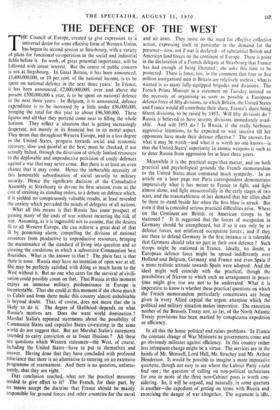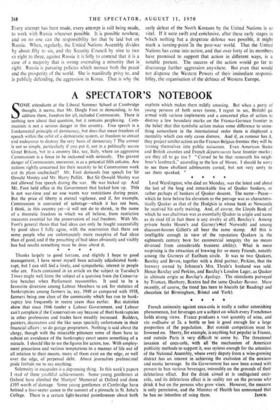THE DEFENCE OF THE WEST
THE Council of Europe, created tp give expression to a universal desire for some effective form of Western Union, has begun its second session at Strasbourg, with a variety of plans for functional co-operation in the social and industrial fields before it. Its work, of great potential importance, will be followed with intent interest. But the centre of public concern is not at Strasbourg. In Great Britain, it has been announced, £3,400,000,000, or 10 per cent. of the national income, is to be spent on national defence in the next three years. In France, it has been announced, £2,000,000,000, over and above the present £500,000,000 a year, is to be spent on national defence in the next three years. In Belgium, it is announced, defence expenditure is to be increased by a little under £36,000,000, bringing the total for this year to about £96,500,000. These figures and all that they portend come near to filling the whole horizon. They reflect a situation that is getting increasingly desperate, not merely in its financial but in its moral aspect. They mean that throughout Western Europe, and in a less degree in the United States, progress towards social and economic recovery, slow and painful at the best, must be checked, if not actually halted, through the diversion of strictly limited resources to the deplorable and unproductive provision of costly defences against a war that may never come. But there is at least an even chance that it may come. Hence the ineluctable necessity of this lamentable subordination of social security to military security. Hence the significant decision of the Consultative Assembly at Strasbourg to devote its first session, even at the cost of straining its standing orders, to a debate on defence which, if it yielded no conspicuously valuable results, at least revealed the anxiety which pervaded the minds of delegates of all nations.
What all this means is that Russia has some prospect of gaining many of the ends of war without incurring the risk of war. Assuming, as it is imoossible not to assume, that she desires ill to all Western Europe, she can achieve a great deal of that ill by promoting alarm, compelling the division of national resources from productive to unproductive resources, bringing the maintenance of the standard of living into question and so creating the conditions in which a subversive Communism best flourishes. What is the answer to that ? The plain fact is that there is none. Russia may have no intention of open war at all. She may be perfectly satisfied with doing so much harm to the West without it. But no one who cares for the survival of civili- sation could possibly count on that. That Russia at this moment enjoys an immense military predominance in Europe is incontestable. That she could at this moment if she chose march to Calais and from there make this country almost unhabitable is beyond doubt. That, of course, does not mean that she is likely to do it. The degree of likelihood depends on what Russia's motives are. Does she want world domination ? Marshal Stalin's repeated statements about the possibility of Communist States and capitalist States co-existing in the same world do not suggest that. But are Marshal Stalin's statements intended to carry conviction or to foster illusions ? All these are questions which Western statesmen—the West, of course, including the United States—have to put to themselves and answer. Having done that they have concluded with profound reluctance that there is no alternative to entering on an extensive programme of rearmament. And there is no question, unfortu- nately, that they are right.
That conclusion reached, what are the practical measures needed to give effect to it? The French, for their part, by no means accept the doctrine that France should be mainly responsible for ground forces and other countries for the naval and air arms. They insist on the need for effective collective action, expressing itself in particular in the demand for the presence—now, not if war is declared—of substantial British and American land forces on the continent of Europe. There is point in the declaration of a French delegate at Strasbourg that France has had enough of being liberated ; she asks this time to be protected. There is force, too, in the comment that four or five million unorganised men in Britain are relatively useless ; what is wanted is so many fully-equipped brigades and divisions. The French• Prime Minister in a statement on Tuesday insisted on the necessity of organising as soon as possible a European defence force of fifty divisions, to which Britain, the United States and France would all contribute their share, France's share being fifteen divisions, to be raised by 1953. Will fifty divisions do ? Russia is believed to have seventy divisions immediately avail- able. And will 1953 do ? Is Russia, if she really harbours aggressive intentions, to be expected to wait inactive till her opponents have made their defence effective ? The answer, for what it may be worth—and what it is worth no one knows—is that the United States' superiority in atomic weapons is such as to deter Russia from aggression for at least three years.
Meanwhile it is the practical steps that matter, and on both practical and psychological grounds the French memorandum to the United States must command much sympathy. In an article on a later page our Paris correspondent demonstrates impressively what it has meant to France to fight, and fight almost alone, and fight unsuccessfully in the early stages of two wars, and the reasonableness of her demand that her allies shall be there to stand beside her when the first blow is struck. But even if that is conceded serious practical difficulties arise. Where on the Continent are British or American troops to be stationed ? It is suggested that the forces of occupation in Germany should be strengthened, but if so it can only be as defence forces, not reinforced occupation forces ; and if they are there to defend Germany in the first instance is it tolerable that Germans should take no part in their own defence ? Such troops might be stationed in France. Ideally, no doubt, a European defence force might be spread indifferently over Holland and Belgium, Germany and France and even Spain if a more realistic attitude towards Spain were adopted. And the ideal might well coincide with the practical, though the possibilities of friction to which such an arrangement in peace- time might give rise are not to be underrated. What it is imperative to know is whether these practical questions on which the French memorandum particularly concentrates are being given in every Allied capital the urgent attention which the political and military situation makes imperative. The execution neither of the Brussels Treaty nor, so far, of the North Atlantic Treaty provisions has been marked by conspicuous expedition or efficiency.
In all this the home political end raises problems. In France the constant change of War Ministers as governments come and go obviously militates against efficiency. In this country rather less infrequent change might be a virtue. The services are in the hands of Mr. Shinwell, Lord Hall, Mr. Strachey and Mr. Arthur Henderson. It would be possible to imagine a more impressive quartette, though not easy to see where the Labour Party could find one ; the question of calling on non-political technicians for one or more of the three non-Cabinet posts is worth con- sidering. So, it will be argued, and naturally, in some quarters is another—the expedient of getting on terms with Russia and exorcising the danger of war altogether. The argument is idle. Every attempt has been made, every attempt is still being made, to work with Russia wherever possible. It is possible nowhere, and on no one can the responsibility for that be laid but on Russia. When, regularly, the United Nations Assembly divides by about fifty to six, and the Security Council by nine to two or eight to three, against Russia it is folly to contend that it is a case of a majority that is wrong overruling a minority that is right. Russia is pursuing policies which menace both the peace— and the prosperity of the world. She is manifestly privy to, and is publicly defending, the aggression in Korea. That is why the early defeat of the North Koreans by the United Nations is so vital. If it were swift and conclusive, after these early stages in 'which nothing but a desperate defence was possible, it might mark a turning-point in the post-war world. That the United Nations has come into action, and that over forty of its members have promised to .support that action in different ways, is a notable portent. The success of the action would go far to discourage further aggression anywhere. But even that would not dispense the Western Powers of their immediate responsi- bility, the organisation of the defence of Western Europe.



































 Previous page
Previous page